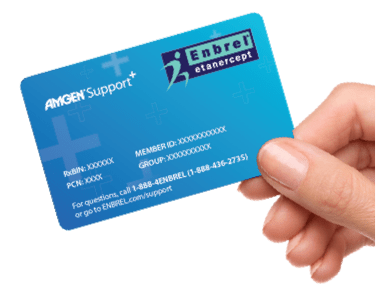What is the most important information I should know about ENBREL?
ENBREL is a medicine that affects your immune system. ENBREL can lower the ability of your immune system to fight infections. Serious infections have happened in patients taking ENBREL. These infections include tuberculosis (TB) and infections caused by viruses, fungi, or bacteria that have spread throughout the body. Some patients have died from these infections. Your healthcare provider should test you for TB before you take ENBREL and monitor you closely for TB before, during, and after ENBREL treatment, even if you have tested negative for TB.
There have been some cases of unusual cancers, some resulting in death, reported in children and teenagers who started using tumor necrosis factor (TNF) blockers before 18 years of age. Also, for children, teenagers, and adults taking TNF blockers, including ENBREL, the chances of getting lymphoma or other cancers may increase. Patients with RA may be more likely to get lymphoma.
Before starting ENBREL, tell your healthcare provider if you:
- Have any existing medical conditions
- Are taking any medicines, including herbals
- Think you have, are being treated for, have signs of, or are prone to infection. You should not start taking ENBREL if you have any kind of infection, unless your healthcare provider says it is okay
- Have any open cuts or sores
- Have diabetes, HIV, or a weak immune system
- Have TB or have been in close contact with someone who has had TB
- Were born in, lived in, or traveled to countries where there is more risk for getting TB. Ask your healthcare provider if you are not sure
- Live, have lived in, or traveled to certain parts of the country (such as, the Ohio and Mississippi River valleys, or the Southwest) where there is a greater risk for certain kinds of fungal infections, such as histoplasmosis. These infections may develop or become more severe if you take ENBREL. If you don’t know if these infections are common in the areas you’ve been to, ask your healthcare provider
- Have or have had hepatitis B
- Have or have had heart failure
- Develop symptoms such as persistent fever, bruising, bleeding, or paleness while taking ENBREL
- Use the medicine Kineret (anakinra), Orencia (abatacept), or Cytoxan (cyclophosphamide)
- Are taking anti-diabetic medicines
- Have, have had, or develop a serious nervous disorder, seizures, any numbness or tingling, or a disease that affects your nervous system such as multiple sclerosis or Guillain-Barré syndrome
- Are scheduled to have surgery
- Have recently received or are scheduled for any vaccines. All vaccines should be brought up-to-date before starting ENBREL. Patients taking ENBREL should not receive live vaccines
- Are pregnant, planning to become pregnant, or breastfeeding
- Have been around someone with chicken pox
What are the possible side effects of ENBREL?
ENBREL can cause serious side effects including: New infections or worsening of infections you already have; hepatitis B can become active if you already have had it; nervous system problems, such as multiple sclerosis, seizures, or inflammation of the nerves of the eyes; blood problems (some fatal); new or worsening heart failure; new or worsening psoriasis; allergic reactions; autoimmune reactions, including a lupus-like syndrome and autoimmune hepatitis.
Common side effects include: Injection site reactions and upper respiratory infections (sinus infections).
In general, side effects in children were similar in frequency and type as those seen in adult patients. The types of infections reported were generally mild and similar to those usually seen in children.
These are not all the side effects with ENBREL. Tell your healthcare provider about any side effect that bothers you or does not go away.
If you have any questions about this information, be sure to discuss them with your healthcare provider. You are encouraged to report negative side effects of prescription drugs to the FDA. Visit www.fda.gov/medwatch, or call 1-800-FDA-1088.
Please see Prescribing Information and Medication Guide.
INDICATIONS
ENBREL is indicated for reducing signs and symptoms, keeping joint damage from getting worse, and improving physical function in patients with moderately to severely active rheumatoid arthritis. ENBREL can be taken with methotrexate or used alone.
ENBREL is indicated for reducing signs and symptoms of moderately to severely active polyarticular juvenile idiopathic arthritis (pJIA) in children 2 years of age
or older.
ENBREL is indicated for reducing signs and symptoms, keeping joint damage from getting worse, and improving physical function in adult patients with psoriatic arthritis. ENBREL can be used with or without methotrexate.
ENBREL is indicated for active juvenile psoriatic arthritis (JPsA) in children 2 years of age or older.
ENBREL is indicated for reducing signs and symptoms in patients with active ankylosing spondylitis.
ENBREL is indicated for chronic moderate to severe plaque psoriasis (PsO) in children 4 years of age or older and adults who may benefit from taking injections or pills (systemic therapy) or phototherapy (ultraviolet light).


